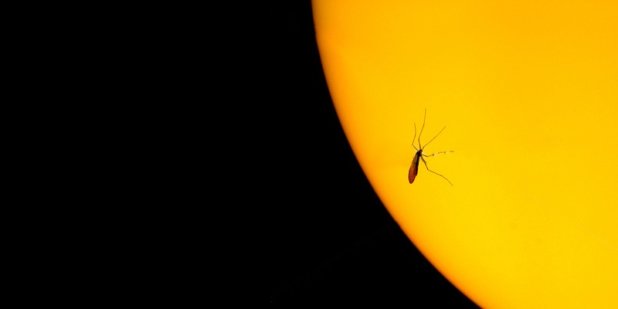- About
- Topics
- Picks
- Audio
- Story
- In-Depth
- Opinion
- News
- Donate
- Signup for our newsletterOur Editors' Best Picks.Send
Read, Debate: Engage.
170 million is the number of working days Kenya looses annually from the death of her population due to malaria. This figure is costing the country vital manpower. In 2000 a declaration should bring the change. What happened since?
Malaria has been a thorn in the flesh for not only Kenya but for sub-Saharan African countries. In April 25th of 2000 a declaration was made by African heads of state to halve the number of deaths cased by malaria in the continent. A declaration though on course it is yet to be fully realized. So, the question begging to be answered is why after a decade past from the Abuja declaration of 2000 are so many Africans living in sub–Saharan Africa still prone to malaria despite nation wide campaigns to eradicate the disease?

Kenya spends millions of shillings of both government and donor money to help eliminate malaria. This is through a malaria control unit under the ministry of health. They have carried out various prevention methods such as free giveaways of treated nets to persons living in malaria prone regions of Kenya, such as the Coast, Nyanza lake regions and those living in the western highlands of Kenya not forgetting every pregnant woman in the country.
The government also works closely with the Kenya Medical Research Institute (KEMRI) to developed vital medications that have a ninety six percent success rate in both treating malaria symptoms and severe malaria complicated cases. Moreover it has carried out residential insecticide spraying and treating of stagnant water with lavacide campaigns to ensure prevention of the disease in mosquito prevalent regions.
This all being carried out by health officers with campaigns running every three years. 2014 to 2015 is a malaria campaign year and the malaria control unit is at it again, educating the public on the disease.
But why after so much input in public advocacy strategies does Kenya still maintain a high death toll of a preventable and curable disease? Well let’s take a look at Agnes a Kenyan citizen and blue-collar worker who has lived in three different regions of Kenya, two of which are in the western highlands of Kenya yearly prone to malaria.
She is no stranger to the effects of the disease for she and her family have been victims of the anopheles mosquito. She has contracted the disease so many times that she cannot seem to count. Interestingly she is still not knowledgeable about the disease, as one would have assumed. She bares misinterpretation of what causes malaria like so many Kenyans do as I came to find out while researching for this article.
 You see majority of Kenyans though having being taught in schools or educated through an advocacy campaign still relate malaria to be a worry of the rain season. So yes, heavy rain pour is a cause of stagnant water where mosquito’s breed but it isn’t the only season where mosquito’s can thrive. Not withstanding many Kenyans do not sleep under mosquito treated nets. To be honest I am a culprit of this. We often wait to be diagnosed with the disease rather than adhering to the proverb prevention is better than cure.
You see majority of Kenyans though having being taught in schools or educated through an advocacy campaign still relate malaria to be a worry of the rain season. So yes, heavy rain pour is a cause of stagnant water where mosquito’s breed but it isn’t the only season where mosquito’s can thrive. Not withstanding many Kenyans do not sleep under mosquito treated nets. To be honest I am a culprit of this. We often wait to be diagnosed with the disease rather than adhering to the proverb prevention is better than cure.
It is only during and after treatment do we find need for the nets. But shortly there after fold them to the land of the forgotten. However, some still through caution to the wind and ignore the role prevention plays.
These two latter groups are the reason why malaria is growing and its eradication is a challenge. Kenyans and Africans have become victims of their own ignorance. We have chosen to overlook individual health responsibilities and laid the entire burden on the governments shoulders.
Back to Agnes our representation of an inside look into the average Kenyan. Does she seek medical attention when faced with sickens? Well like most people, she self-diagnoses herself before seeking relevant medical attention. A common mistake a majority of the population is a master of. A headache, one reaches for a painkiller, a cold.....well you understand where I am headed with this. We often as a population go for medication that mask the diseases symptoms and encourages its development, leading to the condition becoming worse. This indeed has been our undoing.
So it really doesn’t mater if my friend Jennifer is sleeping in a mosquito treated net with her baby in the coastal town of Malindi. Mosquitos move and the more we do not prevent ourselves the more we put new mothers such as Jennifer at risk. The more we put at risk, our mothers, fathers, sisters and brothers. We can stop this vicious cycle if everyone plays a role.
In Kenya people have phased the term in Kiswahili “Serikali Saidia” its translation literally means “Government help”. This term is the reason why we sometimes let go of wisdom and the need to self-help ourselves. American president John F. Kennedy said” Ask not what your country can do for you, ask what you can do for your country “back in 1961 words that seem to resonate with me as I write this story.
Africa needs her champions to stand and take charge and the only hero’s I see play this part are we the Africans from each of the countries making up Africa. We need to stop the mentality of waiting for governmental and donor assistance to care for us. We need to embrace self-love, and to love you means caring for your health. Prevention is always the best option. So like me remove your net from the land of the forgotten, if you have none get one from the government distribution centres and if that’s not possible, spare some few coins and get one and if all this is not possible, cut that grass and clear that stagnant water eliminate mosquito breeding opportunities in your environment and play your role in making Malaria a disease of the past…
More to read
The "Roll back Malaria" action of the World Malaria Day
Kenya - Malaria fact sheet
Ecobank kicks anti-malaria campaign in Kisumu
Project examples of the Kenyan Malaria Strategy 2010-2014
QUOTES IN REGARDS TO MALARIA
